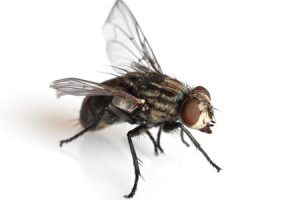Some regions of the US see more fly pests during the spring, summer and fall seasons than others. Unfortunately, numerous fly pest species are active during relatively long periods during the year in Arizona, and many of these species are likely to establish a nuisance presence on properties in the state. Fly issues can become particularly problematic for homeowners who also keep horses and/or livestock on their property, as several flies, like stable flies and horse flies, gravitate toward these animals and their dwellings. Most fly species in Arizona are merely a nuisance near or within homes, but a few species are known for spreading diseases. Flies are one of the most difficult groups of insect pests to control once they establish an infestation on a property, but luckily, it does not take much effort to prevent flies from becoming a nuisance, or a health threat, in homes and yards.
Houseflies, face flies, and blow flies are all attracted to manure, garbage, plant matter, lawn clippings, carrion, compost and overgrown grass. All three of these types of flies are abundant in Arizona, but simply keeping a property free of the materials listed above, particularly waste materials, will virtually ensure that such flies will not become a problem on a lawn. Of course, garbage and waste materials are well known for attracting many fly species, but most fly species can be controlled in areas as long as pet, livestock and horse owners, regularly dispose of waste material.
Arizona is also home to several fly species that are known for inflicting bites on humans. Stable flies, horse flies and deer flies are now well distributed in most areas around the world, but given Arizona’s relatively long periods of warm weather, fly issues can be particularly persistent and abundant in the state. Stable flies, deer flies, or horse flies constitute a number of species that are referred to by a number of different names, but these flies are known to bite humans in order to consume blood-meals when horses and livestock are not available. In most cases, bites from these insects will only result in a feeling of intense pain, as these flies possess powerful mouthparts. In rare cases, however, fly species belonging to these groups can spread a disease known as tularemia.
Do you experience annual fly-pest issues on your property?












